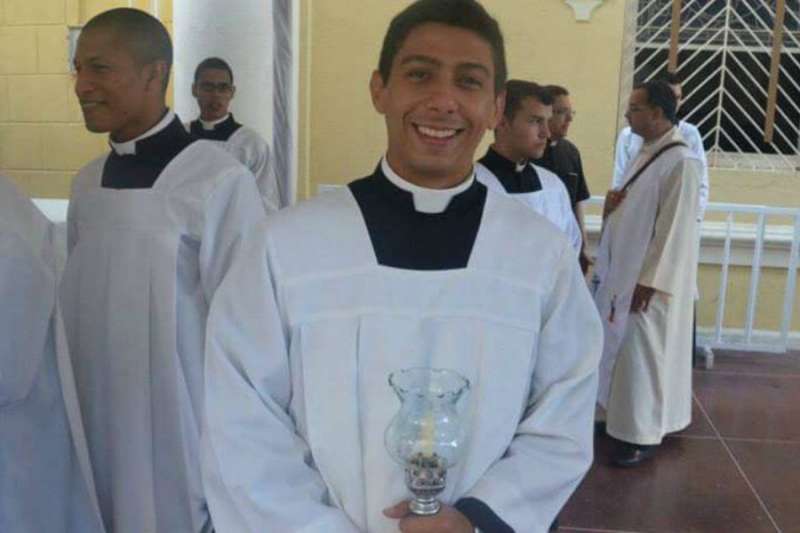When Juan Pablo Hernandez returns to his home in the Archdiocese of Maracaibo, Venezuela next year, he will face a country suffering from a years-long economic crisis. But the 23-year-old seminarian is not afraid.
“I'm happy to go back home and to be able to help the people,” said Hernandez, who is currently studying in Spain.
“Giving them hope is essential. I want to bring them the joy and hope of Jesus Christ so that they can keep their heads above water,” he told ACI Prensa, CNA's Spanish language sister agency.
Venezuela is in the midst of an ongoing economic crisis, as poor economic policies, including strict price controls, coupled with high inflation rates, have resulted in a severe lack of basic necessities such as toilet paper, milk, flour, diapers and medicines.
Added to shortages in food, healthcare supplies, and public services such as water and electricity are problems with personal safety, employment, the circulation and sale of cash, and insufficient public transport.
The city of Maracaibo, where Hernandez is from, has seen power outages lasting nearly three days, leaving food to spoil and the elderly to suffer in the summer heat.
The economic crisis has led 1.2 million refugees to flee Venezuela in the past two years, according to the Center for Strategic and International Studies (CSIS).
“The Church is suffering from this whole precarious situation right along with the people of Venezuela,” Hernandez said. “The government is asphyxiating us bit-by-bit, they want the people to lose hope and settle for the destitution they are given.”
But despite the devastating situation, “trust in God and in the Church has grown” throughout the country, he said.
Many people who did not formerly attend Mass are now “looking for God in the midst of the precariousness,” he said, and to these people, “the Church always extends a hand.”
Additionally, the lack of material goods “brings out people's generosity, and groups are formed to help children and the sick.”
Something very common is the “mercy cooking pot” which is organized in the parishes where “people bring what they have – not what's left over, because no one has any food left over – and with what there is, they cook it up and distribute some 300 servings,” Hernandez said.
It was precisely the desire “to be close to God and to help the people” that drew the seminarian to consider a vocation to the priesthood.
Hernandez said he first heard a call to the priesthood at a friend’s ordination Mass. At the time, he was 19 years old.
“During the celebration of the ordination…I felt something burning inside and that thing stayed with me. I was truly amazed that there are those who are capable of leaving everything to give themselves to God,” he said.
“I didn't understand what was in the hearts of these people that were leaving everything and answering 'Here I am Lord, your will be done',” he recalled.
Although the experience was powerful, Hernandez did not initially consider pursuing the same path for himself. At the time, he had a girlfriend and was studying electrical engineering.
“I didn't want to leave everything for something I would have no control over,” he said.
But a few years later, Hernandez could not shake the feeling “that there was something more I was missing, something greater.”
One day during Mass at his local parish, the priest asked if someone could assist as an altar server. Although Hernandez was above the typical age of altar servers, he volunteered.
“I saw that it was my opportunity to be close to everything that so much drew my attention a few years prior,” he said. “To be so close to the altar, the consecration, the Lord...All that stirred up in me what I had experienced at the ordination of my friend.”
From then on, he became more deeply involved in the parish – teaching catechism, organizing retreats, and joining the pastor in visits to the sick.
“I became impassioned with the priestly life, with being close to God in order to help people…it was a great joy,” he said.
“It wasn't a commitment or a burden, it was something that came from within and made me very happy.”
It has now been seven years since Hernandez decided to become a priest. He is currently taking his final course of Ecclesiastical Studies at the University of Navarre in Spain. Looking back at the past seven years – and ahead to a priestly vocation – he has no regrets.
“I don't know how the Lord does it, but every year surprises me more, and always with something better,” he said. “If I had not responded to his call, I wouldn't be as happy as I am now.”
This article was originally published by our sister agency, ACI Prensa. It has been translated and adapted by CNA.

